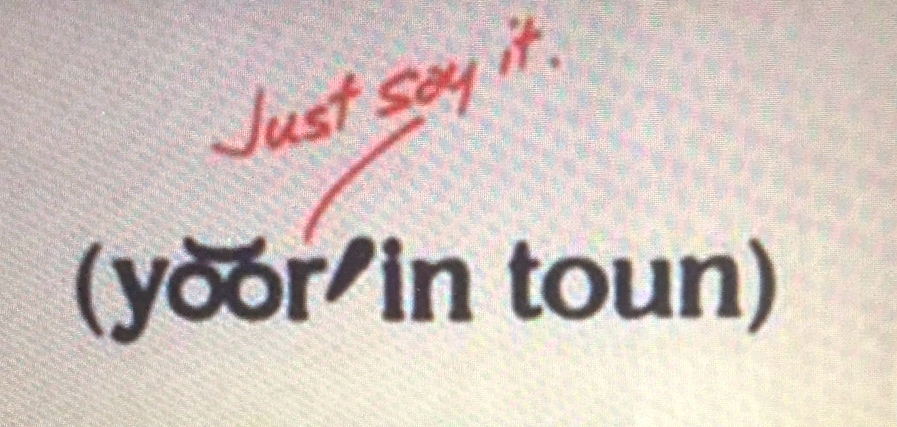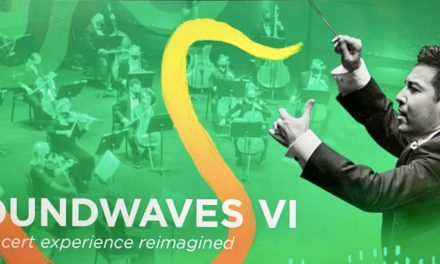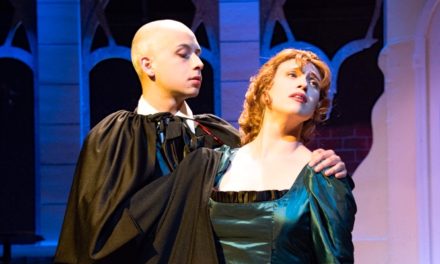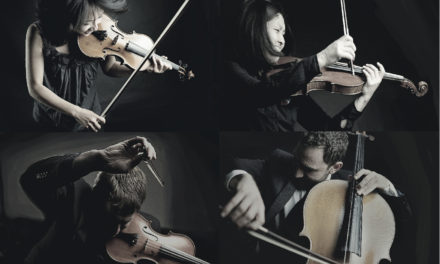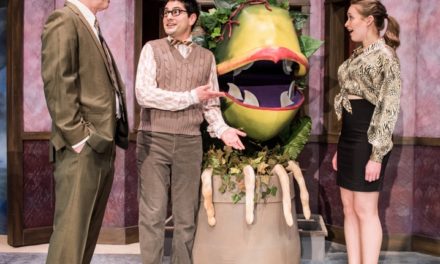By Monique Danziger
Urinetown was born at the impossibly edgy and hip New York International Fringe Festival in 1999. It was an out-of-nowhere hit, evoking the runaway success of Springtime for Hitler, the purposefully badly named show cooked up by the crooked schemers in The Producers. But, unlike Bialystock and Bloom, Urinetown’s creators wholeheartedly wanted audiences to enjoy their show. They just also wanted to stay true to its quirky, off-beat, irreverent soul.
Sure enough, the show’s exceptional wit and wonderful score won audiences over and Urinetown went on to be a Broadway smash, receiving three Tony awards and inspiring countless regional productions.
The production of Urinetown at the Actors Cabaret feels more like what the show’s original fringe festival performances must have been like — intimate and communal. It’s a show that is deeply self-aware and delights in skewering the most beloved and grandiose tropes in musical theater. It is equal parts zany spontaneity, hilarious wordplay, and Malthusian dread. It’s a journey best experienced together, amidst your community.
In his opening address, the narrator Officer Lockstock— a perfectly sardonic Cody Mendonca—lets the audience in on the joke. Spreading his arms wide as the music swells behind him, he smiles wryly and says “Well, hello there. And welcome — to Urinetown. Not the place, of course. The musical!”
This frequent and cheeky breaking of the fourth wall earned Urinetown many comparisons to Berthold Brecht and works well in a venue like the ACE.
Officer Lockstock’s partner in plot exposition is Little Sally, a lovably plucky Savana Johnson, who sets up some of the show’s biggest laughs, such as when she innocently asks when the audience is going to get the backstory and be brought up to speed. This leads Officer Lockstock to advise, “Everything in its time, Little Sally. You’re too young to understand it now, but nothing can kill a show like too much exposition.” To which Little Sally sweetly responds, “How about bad subject matter? Or a bad title, even? That could kill a show pretty good.”
From here we launch into an opening number that evokes the gritty squalor of Little Shop of Horrors’ Skid Row (Downtown). Except in this case, there is more of a drought-stricken dust bowl aesthetic, and there is no uptown bus that will get you out of there.
Joe Zingo’s set and lighting design does an excellent job of creating the claustrophobic, grimy feel of a dismal, near-future world where water is scarce, people are broke and private bathrooms are outlawed.
Any musical theater fan will quickly notice numbers that evoke shades of other classical musicals such as It’s a Privilege to Pee (Think Chicago), Run, Freedom, Run! (Guys and Dolls) Cool (West Side Story) and, of course, Act One Finale (Les Misérables). The score is tight and peppy and the lyrics evoke Stephen Sondheim with their expansive vocal ranges and staccato lyrics.
Hats must be off to Michael P. Watkins, director and vocal director, for managing the feat of holding together such an ambitious theatrical repertoire. It is a credit to the entire cast that they manage these demanding arrangements, hitting every note and ensuring the audience doesn’t miss a beat.
There are also strong performances along the way, including Kim Fairbairn as Penelope Pennywise, who runs the pay-to-pee Amenity No. 9. She serves the audience some Mae West realness while belting out lyrics like “20 years we’ve had the drought, and our reservoirs have all dried up, I take my baths now in a coffee cup, I boil what’s left of it for tea.”
Another standout is Scott Machado’s interpretation of the greedy capitalist foil, Caldwell B. Cladwell. Machado delivers the laughs with his well-timed facial expressions all the way through his redemption arc as a man just trying to keep the water from running out.
Joel Ibanez delights as Lockstock’s law enforcement force of one, Officer Barrell. Chad Lowe as Bobby Strong, the sweet-faced protagonist and Clarae Smith as his star-crossed love, Hope Cladwell, work well together to breathe life into the show’s two most earnest characters.
What propels Urinetown forward is its humor. It is a very funny show, getting the jokes set up early and keeping them coming throughout the two-hour run time. It mixes the tried-and-true tricks of slapstick, farce, satire and self-deprecation. It flirts with sentimentality, but never lingers. The writers show their penchant for improv with physical comedy bits that manage to offset the saccharine moments and give the whole production a dreamlike strangeness — such as when several members don fuzzy pink ears and bunny hop across the stage in Don’t Be the Bunny.
At its core, Urinetown is a tragicomedy about ecological disaster and death. And while it delivers each blow with a smile and a shrug, the audience will leave not so much pondering the need for more responsible resource management or their own mortality, but the more personal question of why we sometimes do bad things for good reasons, and vice versa.
The Urinetown cast at the Actors Cabaret brings all the passion and skill needed to breathe life into this unique and remarkable show that’s a mix of Threepenny Opera, Shakespearean tragedy and Sondheim Polyphony.
It’s a rare treat that delights and puzzles — and should not be missed.
Urinetown
When: Evenings at 8 p.m. on June 28-29, July 5-6, 12-13, 19-20 and 26-27; matinees at 2 p.m. on July 14 and 21
Meals: Available before performances by reservation at time of ticket purchase
Where: 996 Willamette St., Eugene
Tickets: Show-only $16 to $28; dinner-and-show $37.95 to $42.95 opening weekend, $45.95 to 52.95 remainder of run, brunch-and-show $40.95 5o $42.95; available at the box office, 541-683-4368, from 11 a.m. to 3 p.m. Tuesday through Saturday or online (except same day as show) at actorscabaret.org

